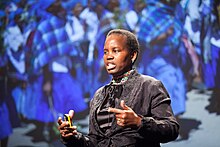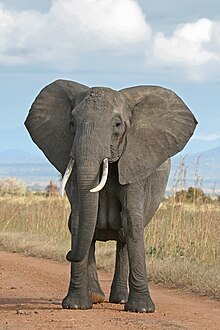Intro
Botswana, officially the Republic of Botswana, is a landlocked country in Southern Africa. Botswana is topographically flat, with approximately 70 per cent of its territory being the Kalahari Desert. It is bordered by South Africa to the south and southeast, Namibia to the west and north, Zambia to the north and Zimbabwe to the northeast. Being a country of slightly over 2.4 million people and roughly the size of France, Botswana is one of the most sparsely populated countries in the world. It is essentially the nation-state of the Tswana people, who constitute 70 per cent of the population. The Tswana ethnic group are descended mainly from Bantu-speaking peoples who migrated into southern Africa, including modern Botswana, in several waves before AD 600. In 1885, the British colonised the area and declared a protectorate named Bechuanaland. As decolonisation occurred, Bechuanaland became an independent Commonwealth republic under its current name on 30 September 1966. Since then, it has been a parliamentary republic with a consistent record of uninterrupted democratic elections, though as of 2024 the Botswana Democratic Party has been the ruling party since independence. As of 2024[update], Botswana is the third least corrupt country in Africa, according to the Corruption Perceptions Index published by Transparency International. The economy is dominated by mining and tourism. Botswana has a GDP (purchasing power parity) per capita of about $20,158 as of 2024[update]. Botswana is the world's biggest diamond-producing country. Its relatively high gross national income per capita (by some estimates the fourth-largest in Africa) gives the country a relatively high standard of living and the second-highest Human Development Index of continental Sub-Saharan Africa (after South Africa). Botswana is a member of the Southern African Customs Union, the Southern African Development Community, the Commonwealth of Nations, and the United Nations. (Full article...)
Selected article -Unity Dow (née Diswai; born 23 April 1959) is a Motswana lawyer, human rights activist, specially elected member of parliament, and a writer. She formerly served as a judge on the High Court of Botswana and in various Botswana government ministries. Born in the Bechuanaland Protectorate to a seamstress and a farmer, who insisted on their children obtaining an education, Dow grew up in a traditional rural village before modernisation. She earned a law degree in 1983 from the University of Botswana and Swaziland, though her studies were completed in Swaziland and University of Edinburgh, Scotland, as Botswana had no law school at the time. After her graduation, Dow opened the first all-woman law firm in Botswana and in 1997 became the first woman to be appointed as a judge to the country's High Court. During her time in law, Dow was involved in three historic cases in Botswana. In 1990, she was the plaintiff in the landmark legal case, Unity Dow v Attorney-General, which ended the gender discrimination in the nation's nationality laws that had previously not allowed children to derive nationality from their married mothers. The case gained Dow international attention and sparked a wave of changes eliminating gender disparity in nationality laws across Africa. In 2006, as the presiding judge in the case of Roy Sesana and Others v. the Government of Botswana, Dow ruled against the government's actions to prohibit the Basarwa indigenous people from living and hunting on their ancestral lands, forcing them to resettle outside the Central Kalahari Game Reserve. She ruled that the government had to restore basic services, allow the Basarwa to return to the land and obtain hunting permits, and pay damages to those who had been forcibly relocated if they chose not to return. In 2014, Dow served as legal counsel for LEGABIBO (Lesbians, Gays & Bisexuals of Botswana) in their case to register their organisation with the Department of Civil and National Registration and successfully received a ruling for the government to allow the organisation to be registered. (Full article...)Did you know - ... that the serval has the longest legs of any cat relative to its body size? This is a good article, A-class article, featured list, or featured article, one of Wikipedia’s best work.
Elephants are the largest living land animals. Three living species are currently recognised: the African bush elephant (Loxodonta africana), the African forest elephant (L. cyclotis), and the Asian elephant (Elephas maximus). They are the only surviving members of the family Elephantidae and the order Proboscidea; extinct relatives include mammoths and mastodons. Distinctive features of elephants include a long proboscis called a trunk, tusks, large ear flaps, pillar-like legs, and tough but sensitive grey skin. The trunk is prehensile, bringing food and water to the mouth and grasping objects. Tusks, which are derived from the incisor teeth, serve both as weapons and as tools for moving objects and digging. The large ear flaps assist in maintaining a constant body temperature as well as in communication. African elephants have larger ears and concave backs, whereas Asian elephants have smaller ears and convex or level backs. Elephants are scattered throughout sub-Saharan Africa, South Asia, and Southeast Asia and are found in different habitats, including savannahs, forests, deserts, and marshes. They are herbivorous, and they stay near water when it is accessible. They are considered to be keystone species, due to their impact on their environments. Elephants have a fission–fusion society, in which multiple family groups come together to socialise. Females (cows) tend to live in family groups, which can consist of one female with her calves or several related females with offspring. The leader of a female group, usually the oldest cow, is known as the matriarch. (Full article...)General images -The following are images from various Botswana-related articles on Wikipedia.
Related portalsOther South African countriesReligion in BotswanaBotswana-related articlesCategoriesAssociated WikimediaThe following Wikimedia Foundation sister projects provide more on this subject:
| |||||||||||||||||











































































